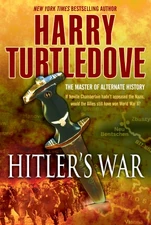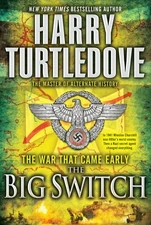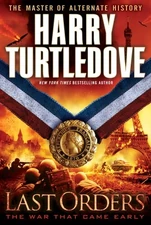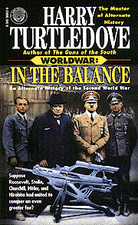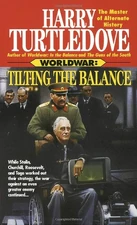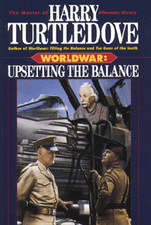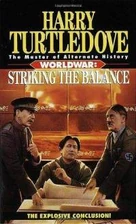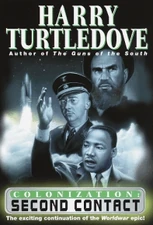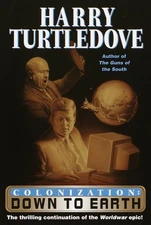| Josef Goebbels | |
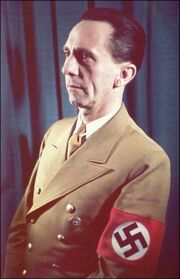
| |
| Historical Figure | |
| Nationality: | Germany (born in Prussia) |
| Year of Birth: | 1897 |
| Year of Death: | 1945 |
| Cause of Death: | Suicide by firearm |
| Religion: | Originally Catholicism, left the faith, later religious status unclear |
| Occupation: | Journalist, Politician, Propagandist, Author of Non-Fiction, Author of Fiction |
| Spouse: | Magda Ritschel |
| Children: | Six, all murdered by their parents |
| Political Party: | NSDAP |
| Political Office(s): | German legislator, Minister for Public Enlightenment and Propaganda, Chancellor of Germany |
| Fictional Appearances: | |
Dr. Paul Joseph Goebbels (29 October 1897 – 1 May 1945) was a German politician and Minister for Public Enlightenment and Propaganda in Nazi Germany from 1933 to 1945. He was one of German dictator Adolf Hitler's closest associates and most devout followers. Goebbels was known for his zealous, energetic oratory and virulent antisemitism, which progressed into advocacy of the extermination of the Jews. He was an effective propagandist, perfecting the so-called "Big Lie" technique, which is based on the principle that a lie, if audacious enough and repeated enough times, will be believed by the masses.
Goebbels, who aspired to be an author, obtained a Doctor of Philology degree from the University of Heidelberg in 1921. He joined the Nazi Party in 1924, working in their northern branch. He was appointed Gauleiter (district leader) for Berlin in 1926, where he began to take an interest in the use of propaganda to promote the party and its program. After the Nazis' seizure of power in 1933, Goebbels's Propaganda Ministry quickly gained and exerted control over the news media, arts, and information in Germany. He was particularly adept at using the relatively new media of radio and film for propaganda purposes. Topics for party propaganda included antisemitism, attacks on the Christian churches, and (after the start of World War II) the shaping of morale.
In 1943, Goebbels began to pressure Hitler to introduce measures that would produce total war, including closing businesses not essential to the war effort, conscripting women into the labor force, and enlisting men in previously exempt occupations into the Wehrmacht. Hitler finally appointed him as Reich Plenipotentiary for Total War on 23 July 1944, whereby Goebbels undertook largely unsuccessful measures to increase the number of people available for armaments manufacture and the Wehrmacht.
As the war drew to a close and Nazi Germany faced defeat, Magda Goebbels and the Goebbels children joined him in Berlin. They moved into the underground Vorbunker, part of Hitler's underground bunker complex, on 22 April 1945. Hitler committed suicide on 30 April. In accordance with Hitler's will, Goebbels succeeded him as Chancellor of Germany; he served one day in this post. In his only official act, he dictated a letter to General Vasily Chuikov, commander of the Soviet forces that had entered central Berlin. Goebbels' letter informed Chuikov of Hitler's death and requested a ceasefire. When Chuikov rejected his request, Goebbels concluded that that further efforts were futile.
The following day, Goebbels had his six children poisoned with cyanide. Then he and Magda committed suicide, either by cyanide or by self-inflicted gunshot.
Josef Goebbels in The Man With the Iron Heart[]
| The Man With the Iron Heart POD: May 29, 1942; Relevant POD: May, 1945 | |
| Type of Appearance: | Posthumous reference |
While Josef Goebbels had committed suicide shortly after Adolf Hitler did in 1945, the German Freedom Front made some use of Goebbels' propaganda techniques in their subsequent resistance.[1]
Josef Goebbels in "Cayos in the Stream"[]
| "Cayos in the Stream" POD: c. July, 1942 | |
| Type of Appearance: | Contemporary reference |
The propaganda films put out by Josef Goebbels and his office only showed German submarines in their idealized condition as proud, pristine machines of war, with their crews in proper dress uniform. Ernest Hemingway learned the truth about this matter in 1942, when he encountered a U-boat off the Cuban coast. The sub had quick sloppy welds, rusty patches, and barnacles on the hull. Its sailors were quite mangy looking, with weeks or months of beard, corpse-pale skin, torn grease-stained shirts, and creaseless dungarees. However, this did not diminish the sense of danger they exuded.
Josef Goebbels in Worldwar[]
| Worldwar POD: May 30, 1942 | |
| Appearance(s): | In the Balance through Down to Earth |
| Type of Appearance: | Contemporary references |
| Date of Death: | 1965 |
| Cause of Death: | Killed during the Race-German War of 1965, probably by an explosive-metal bomb |
Josef Goebbels (1897-1965) was an important member of the Nazi Party and a close advisor of Adolf Hitler. During World War II and the war against the Race's Conquest Fleet, Goebbels served as Germany's Propaganda Minister.[2] After Hitler's death, Goebbels attempted to become Führer and Chancellor of the Greater German Reich but he was defeated by SS chief Heinrich Himmler.[3] After Himmler's death in 1965, Goebbels once again attempted to become Führer, and secured seats on the Committee of Eight for himself and a few of his allies.[4] However, his ambitions were once again thwarted by an SS man, this time Ernst Kaltenbrunner.[5] Shortly afterwards, Goebbels was killed during the Race-German War of 1965 along with Kaltenbrunner himself, and everyone else senior to Walter Dornberger.[6]
Josef Goebbels in In the Presence of Mine Enemies[]
| In the Presence of Mine Enemies POD: c. 1940 | |
| Type of Appearance: | Posthumous reference |
| Date of Death: | Unrevealed |
Josef Goebbels was the first Minister of Propaganda of the Greater German Reich. The country's information and entertainment infrastructure used the model he established right into the 21st century.[7] They also followed his penchant for adultery.[8]
Josef Goebbels in "The Last Article"[]
| "The Last Article" POD: c. 1940 | |
| Type of Appearance: | Contemporary reference |
After confronting Mohandas Gandhi in Nazi occupied India in 1947, German Field Marshal Walther Model remarked to his troops, "If we did not have Goebbels, this would be the one for the job." Gandhi responded in slow but clear German: "I thank you, Field Marshal, but I believe that to be no compliment."
Josef Goebbels in The War That Came Early[]
| The War That Came Early POD: July 20, 1936; Relevant POD: September 29, 1938 | |
| Type of Appearance: | Contemporary references throughout |
Josef Goebbels' talent for propaganda was useful before and during the outbreak of the Second World War, and contributed to Germany's initial success. A Goebbels propaganda campaign had convinced France that the so-called Westwall was heavily fortified, thus slowing down the French invasion of Germany. In fact, the Westwall was nowhere near completion, and the complete parts were undermanned.[9]
In 1939, he was able to create doubt as to just who sank the SS Athenia, thus protecting the identity of U-boat commander Julius Lemp, and keeping the United States out of the war for the time being.[10]
Around this time, he attended a performance of Tannhäuser at the Staatsoper.[11]
As the war continued, Goebbels was tasked with downplaying the setbacks the German military experienced, such as the failure to take Paris before the end of 1939.[12] Goebbels himself appeared in public, taking in a night at the opera, to help the spirits of the German people up.[13]
In 1940, with the "big switch", which saw Britain and France join Germany against the Soviet Union, Goebbels's propaganda shifted, extolling the virtues of Germany's new allies. Naturally, after Britain and France both declared war on Germany again over the course of 1941, that propaganda shifted back to attacks.
Throughout 1942 and into 1943, Goebbels had to make increasingly untenable claims as to how well Germany was doing.[14] As 1943 closed, Goebbels was forced to loudly deny that the German people were growing increasingly dissatisfied with the course of the war and with Nazi rule.[15] Ultimately, his efforts to hide the truth were fruitless, and the German people were aware of Germany's precarious position.[16]
Finally, after Adolf Hitler declared war on the United States in March 1944, a group of military and political leaders calling itself the Committee for the Salvation of the German Nation decided that the war was unwinnable and took action.[17] When Hitler gave a broadcast speech in Münster about the insurrection taking place there, he was killed by a bomb planted by the Committee. Immediately the Committee took over the radio broadcast and their leader General Heinz Guderian announced Hitler's death and that the Committee was taking over. He also announced the imminent arrest of Goebbels, among other prominent Nazi leaders.[18] Goebbels immediately took refuge at the Italian embassy in Berlin.[19] However, as Hitler's surviving ally, Benito Mussolini, was facing troubles retaining power himself, Goebbels' fate was increasingly uncertain.[20]
Josef Goebbels in Joe Steele[]
| Joe Steele POD: 1878; Relevant POD: July, 1932 | |
| Novel or Story?: | Novel |
| Type of Appearance: | Contemporary reference |
Propaganda Minister Josef Goebbels screamed like a branded calf about "terror flyers" in early 1941, when Royal Air Force planes managed to make counterattacks over German cities during the Battle of Britain.[21]
References[]
- ↑ See, e.g. The Man With the Iron Heart, pg. 106.
- ↑ See, e.g., In the Balance, pg. 104; Second Contact pg. 168.
- ↑ Down to Earth, pg. 340.
- ↑ Ibid., pg. 344.
- ↑ Ibid., pg. 547.
- ↑ Ibid., pg. 614.
- ↑ See, e.g., In the Presence of Mine Enemies, pg. 49.
- ↑ Ibid., pg. 301.
- ↑ Hitler's War, pg. 79.
- ↑ Ibid., pg. 223
- ↑ West and East. pg. 102
- ↑ West and East, pg. 75.
- ↑ Ibid., pg. 102.
- ↑ See, e.g., Last Orders, pg. 36.
- ↑ Ibid., pg. 199.
- ↑ Ibid., pg. 270.
- ↑ Last Orders, pgs. 300, 311, HC.
- ↑ Ibid, pgs. 299-300.
- ↑ Ibid, pg. 382.
- ↑ Ibid.
- ↑ Joe Steele, pg. 233, HC.
| Titles and Succession | |||||||||||||||||||||||||||
|---|---|---|---|---|---|---|---|---|---|---|---|---|---|---|---|---|---|---|---|---|---|---|---|---|---|---|---|
| |||||||||||||||||||||||||||
| |||||||||||||||||||||||||||||||||||||||||||||||||||||||||||||||||||||||||||||||||||||||||||||||||||||||||||||||||||||||||||||||||||||||||||||||||||||||||||





